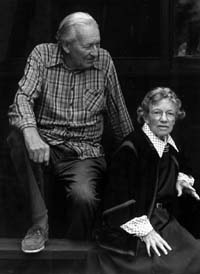He was concerned with thelimitsof the cultural determination of truth in various ways. He asked in speculations on "third level truth" what happens when learning involves the submitting of cultural truths to some more complex learning, such as the learning occurring out of the intimate knowledge of two different cultural systems. One possibility was a transcending of the particular system of cultural common sense to some more general understanding of the human condition. Another probe at the limits of relativism was the study of those systems which were pathological as systems of communication, which had to break down in whole, or in relation to some component. The doublebind theory was concerned with such systems.
Gregory Bateson and Margaret Mead in Carmel CA, the last timethey saw each other, August 1978.
"August 1978. Gregory came up from Esalen to lunch with me. It was thelast time they saw each other - she died in November." (Fred Roll)
Photo: ©: Fred Roll

The moral stance here is not that different from cultural relativism in its motivation. Both positions - a radical relativism and a critique of pride, power, and narrowly defined pragmatic thinking as pathological - are criticisms of Western attitudes of superiority and exploitation over other peoples and over nature. But the two are profoundly different in their content. The notion of cultural relativism, as vague as it may be, has difficulty accommodating the notion of error. There is little place in a radical doctrine of cultural relativism, as there is in Bateson's developed conception, for the possibility that an entire culture might be suffering from systemic disorders of internal adjustment or external adaptiveness.
Much of this draws on a very old intellectual tradition, going back, as Bateson himself remarked, at least to Heraclitus who noted for example the danger that reason at the service of private advantage posed to Logos, the cosmic order. Bateson acknowledged and drew support from many illustrious progenitors. Much of his work was highly innovative - double-bind theory, schismogenesis, the logical typing of aspects of learning, and many other ideas that time must test. Perhaps above all he was a channel through which certain new ways of looking at things (or revitalized old ways) flowed to a segment of for the most part American and English intellectual workers (his works are now being translated into French and Spanish) in half a dozen fields. He gave some of these ideas clearer form and applied them to novel events and materials.
He would have considered a valedictory article concerned with his originality and individuality to have missed the point. As he put it,
Freudian psychology expanded the concept of mind inwards to include the whole communication system within the body - the autonomic, the habitual, and the vast range of unconscious process. What I am saying expands mind outwards. And both of these changes reduce the scope of the conscious self. A certain humility becomes appropriate, tempered by the dignity or joy of being part of something much bigger [1972:462-463].
He had extended his idea of "mind," beyond the skin. He extended it once again, particularly in his last bookMind and Nature. He elaborates there the characteristics of systems which seem to him to have the essential features that also characterize human mind, and he found them essential aspects of living systems (including systems such as ecological systems made up of "living elements") in general, as well as complex cybernetic systems constructed by man.
He tried to grasp the intellectual and moral implications of this view of the individual as a subsection and representative of such more general processes.
Andlast,thereisdeath.Itisunderstandablethat,


 正在提交中...
正在提交中...



